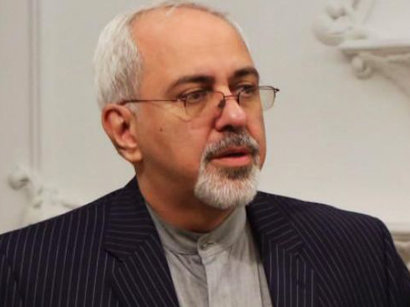Iran optimistic about nuclear talks

By Sara Rajabova
Iran's foreign minister expressed optimism about settling the decade-old standoff over Tehran's nuclear energy program.
"I am optimistic about the political will of the two sides; however, we will not allow those who are always fantasizing and plotting to get a chance," Mohammad Javad Zarif said on the sidelines of the 17th Non-Aligned Movement (NAM) foreign ministerial conference in Algiers on May 28.
Zarif said Iran will do its best to achieve a final agreement, and its objective in the talks is to say that Iran's nuclear program has always been peaceful, and the country will never seek to build nuclear weapons.
He also noted that negotiations between Iran and the six powers - the United States, China, Russia, France, Britain, and Germany- over Tehran's nuclear energy program "have made progress, but this issue is very difficult and complicated."
Commenting on his recent unofficial two-day talks with EU Foreign Policy Chief Catherine Ashton over Iran's nuclear case in Istanbul, Zarif said the talks lasted for about eight hours and focused on the "opportunities ahead."
After the talks, Zarif told reporters that reaching a result in the negotiations is "completely possible" and Tehran is pursuing the negotiations with "seriousness, accuracy, and without any rush."
"Our basis for work is protecting the Iranian people's rights and the country's dignity and pride, and removing brutal obstacles in the way of the country's progress," Zarif pointed out.
Seyyed Abbas Araqchi, Iranian Deputy Foreign minister and senior nuclear negotiator, described the talks between Zarif and Ashton as "long, but useful."
The two sides held discussions on different ways of advancing nuclear talks between Tehran and the six powerson May 26-27.
Iran and the P5+1 group wrapped up their latest round of high-level nuclear talks inVienna, Austria, on May 16 without any result.
Iranian officials blamed the U.S. for the failure, claiming that Washington has made excessive demands beyond the agreements made in the previous rounds of talks.
Iran and P5+1 have been discussing ways of ironing out differences and drafting a final deal that would end the West's dispute with Iran over its nuclear program.
The two sides signed an interim nuclear deal in the Swiss city of Geneva last November, and it came into force on January 20 this year.
Under the Geneva deal, the six countries pledged to provide Iran with some sanctions relief in exchange for Tehran's agreement to scale down certain aspects of its nuclear activities during a six-month period.
Here we are to serve you with news right now. It does not cost much, but worth your attention.
Choose to support open, independent, quality journalism and subscribe on a monthly basis.
By subscribing to our online newspaper, you can have full digital access to all news, analysis, and much more.
You can also follow AzerNEWS on Twitter @AzerNewsAz or Facebook @AzerNewsNewspaper
Thank you!
